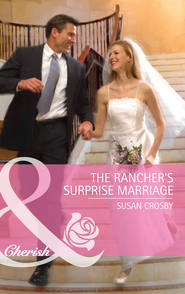По всем вопросам обращайтесь на: info@litportal.ru
(©) 2003-2025.
✖
Mendoza's Return
Автор
Год написания книги
2019
Настройки чтения
Размер шрифта
Высота строк
Поля
Melina snapped the lid shut, and with it, the memories. She tossed the box into the carton and stacked the rest of the items inside. Then right before she shoved the cartons into the closet, she pulled out their senior yearbook and tucked it under her arm.
The only way she could move forward was to look back first.
The next morning Melina looked up Rafe’s business address on the internet, mapped directions, then made the drive to downtown San Antonio. His office was on the fifth floor of a building overlooking the River Walk. She had to identify herself to the lobby security personnel and get permission from Rafe’s office before she was allowed up the elevator, so the element of surprise was gone by the time she reached his office, a richly appointed, incredibly quiet space of dark woods and leather.
One of the things they’d promised each other all those years ago when they’d made the mutual decision to become lawyers was that their office wouldn’t be luxurious, that they wouldn’t have more than they needed to do the job. The building they’d picked out changed hands frequently, with long periods of vacancy between. As Rafe had noted at the reception, these days it looked ready for demolition.
It had hurt when he’d said that so easily about their one-time dream house.
Rafe’s attractive and curious assistant escorted Melina into Rafe’s office as soon as she arrived. He got up from his desk and came around it.
“Thank you, Vonda,” he said as she closed the door on her way out. “This is a surprise.”
Melina rarely got flustered, but being alone with him in his office, this tangible symbol of his success, stabbed at her. The last thing she needed was to be defensive or cool—or let her ego or pride get in the way. A little boy depended on her doing the right thing, saying the right thing.
And yet frustration built inside her, a growing need to yell at him, to say what she hadn’t been allowed to all those years ago when he’d broken up with her—by letter. She’d made so many speeches to him in her head through the years.
“Very nice,” she said, tamping down her emotions, moving around him to look out his window. She loved the River Walk, always had, no matter how many tourists roamed the area. His view was pretty but obstructed slightly by hotels and other tourist attractions.
“What can I do for you, Melina?” he asked, having come up behind her.
She moved away, not turning around to look at him until she could no longer feel the heat from his body, imagined or otherwise, radiating into her space. “Angie said you were willing to talk to me about a new patient my partner and I just took on.”
Rafe indicated a leather sofa. “I don’t know that my answer will be any different,” he said as they sat at opposite ends. “But I thought I should know more.”
“He’s a ten-year-old boy named Elliot Anderson, and he has Asperger’s syndrome.”
“You’ll need to educate me about Asperger’s.”
“It’s a form of autism spectrum disorder. They’re smart kids, and they can totally focus on something they have an interest in, but they have difficulties socially. They don’t tend to make eye contact and don’t know how to interpret expressions to understand how someone feels. It makes it hard for them to be part of a team, any kind of team, especially because they can be very direct.”
“Okay.”
The intensity of his unswerving eye contact made her stomach flutter. She wished he’d sat at his desk instead. “Elliot wants to play baseball,” she said. “His father has worked with him on hitting for several years. Apparently he’s exceptional.”
“And he’s come up against resistance from the coaches, Angie said.”
“One coach, not all of them. And ‘resistance’ is putting it mildly in this case. The Andersons moved to town after registration was closed for this season, but the league could make an exception if they wanted to, given that the family hadn’t moved in yet. Elliot and his parents showed up at a practice, hoping to talk one of the coaches into taking him on, but it didn’t go well.”
“In what way?”
“The coach was pushing the players hard, berating them, even ridiculing them. Elliot, who only knows how to comment honestly on what he observes, told the coach he was mean.”
“Kids—and parents—often think a coach is mean,” Rafe said. “Did he know about Elliot’s condition?”
“Not at that point, and if Elliot had left it at that, maybe it wouldn’t have mattered, but he added that the coach was fat. Elliot doesn’t distinguish between a compliment and an insult. He was stating what he saw was a fact.”
“What happened?”
“His father intervened. He explained privately about Elliot’s condition, and then told the coach how the only way Elliot can learn about team play is by being on a team. There aren’t any special-needs teams in town, only in San Antonio, and Elliot probably doesn’t belong on that kind of team, anyway.” She paused. “I’m gathering that Angie didn’t tell you who the coach is.”
“No, but I’m going to guess it’s Beau Bandero.”
“Yes.”
Rafe got off the couch and moved to the window, looking out as she had earlier. “He built that sports complex with his own money. He owns it.”
“He’s the king, all right.”
“Which means he sets his own rules. And he’s a bitter man. Always has been, even in the days we played together. But after his injury knocked him out of the majors, he probably got worse.” Rafe faced her. “So, what did Beau do next?”
Melina clenched her fists in her lap. “He let Elliot get up to bat, then he hit him with the first pitch.”
“Intentionally?” He looked at her in shock.
“Who knows? Another coach happened to catch it on video, but it’s impossible to know the truth. People with Asperger’s often don’t feel pain to the same degree that others do. Elliot just stood there waiting for another pitch, like he does when his dad pitches to him. Beau chewed him out for not running to first, called him too stupid to play. Elliot told him he didn’t know that rule because no one had hit him before.”
“And that wasn’t good enough for Beau, I guess.”
“He told Elliot it was too late to join the team this year. He’d missed four practices already, and he needed more practice than the average kid.”
“The schoolyard bully grown older but unchanged.”
“Elliot’s probably been called stupid before, and weird, and all sorts of other names,” Melina said. “He’s probably been bullied by kids his own age who don’t understand why he’s different. But for an adult to do it? Consciously? That’s criminal.”
Rafe leaned against the window jamb, his arms folded. He couldn’t remember being angrier at Beau—and there’d been plenty of anger in high school, even fistfights. The competition between them had been fierce, producing a natural enmity. “What’s your job in all this, Melina? How did you get involved?”
“Occupational therapists are experts in the social, emotional and physiological effects of illness and disease. We plot a different course of treatment for each patient, depending on their needs.” She crossed her legs and relaxed against the sofa. “I help stroke victims so that they can get back to living their lives. Children with autism need self-help skills. In Elliot’s case, my partner and I hit a dead end with attorneys being able to help, especially given the narrow time frame.” Her voice grew stronger, more insistent. “Elliot can’t afford to miss the practices, Rafe, and the season starts in a few weeks. He may be a great batter, but he needs to learn about teamwork.”
Silence deadened the air for a few long seconds as he weighed her words. He’d hoped she’d come to him to open up a discussion between them, to settle things, that maybe she was feeling the same as he was—still trapped in the past and all that never got said between them. But obviously she’d come to see Rafe the lawyer, not Rafe the man.
“You want to pursue legal action against Beau?” he asked.
“We don’t see an alternative.”
“And you want me to handle it.” Not a question but a statement of fact. She wouldn’t have come to see him except that she was fighting for this little boy and didn’t have anyone else to turn to. It was the second time since he’d moved back to Texas that he’d been sought for skills outside his specialty.
“Please,” she said.
“Mel, I haven’t done anything but corporate work since I finished law school. The Americans with Disabilities Act is way outside my expertise. I’m not even sure this is an ADA case.”
“You always were a quick study.”
He almost laughed. The idea was ludicrous. And yet here she sat all calm and businesslike, except for the fire in her eyes, as if daring him. Like in the old days …
She stood, her eyes gone dull. “Never mind. Apparently you prefer making more money for already rich tycoons than helping one little boy with an almost impossible dream.” She glanced pointedly at a glass case on the wall filled with baseball trophies from his days as a player, T-ball through college. Nothing she said could speak more loudly to him than that one look.
She walked to the door, grabbed the handle.











